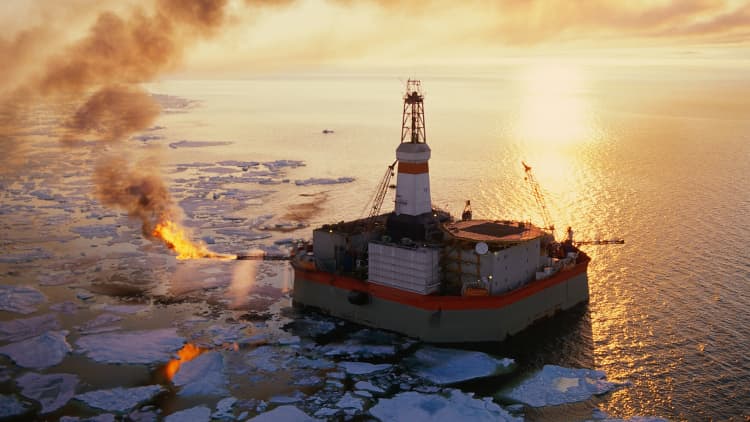California has released its battle plan in a brewing war between the White House and coastal states opposed to the Trump administration's expansive offshore drilling ambitions.
The state's powerful land commission said on Wednesday it will refuse to issue permits for infrastructure that drillers need to bring oil and gas from offshore fields to land. Meanwhile, the California Coastal Commission, which has authority to review oil and gas activity off the state's shores, also formally opposed Trump's plan to allow new drilling in Pacific waters.
The strategy could serve as a blueprint for the governors and congressional delegations of coastal states, who are overwhelmingly united in bipartisan opposition to Trump's plan to open nearly all of the U.S. Outer Continental Shelf to oil and gas development.
California's three-member State Lands Commission is vowing to block construction of pipelines or to permit oil and gas from new offshore developments to flow through existing lines.
California Lt. Gov. Gavin Newsom, who chairs the commission, said the state will use "every tool available" to resist President Donald Trump's "cynical, regressive agenda."
"I am resolved that not a single drop from Trump's new oil plan ever makes landfall in California, where our leadership in reducing emissions and curbing pollution has enabled exceptional economic growth," Newsom said in a statement.

The commission announced the plan ahead of a public meeting in Sacramento with the Trump administration to gather feedback on the offshore drilling schedule. It is the only meeting scheduled in California.
"Creating a Five Year Program is a very open and public process, and [Interior Secretary Ryan] Zinke looks forward to meeting with more Governors and other coastal representatives who want to discuss the draft program," the Interior Department said in a statement.
Without pipeline infrastructure, energy companies would have to rely on an expensive alternative used in deepwater drilling, which involves pumping hydrocarbons into massive floating storage stations and transferring oil onto ships to be brought to market.
It's uncertain drillers are willing to shoulder that cost at a time of relatively low oil prices, when many companies are focusing on shorter-cycle development like production from onshore U.S. shale fields.
"That would effectively kill the project," said Jeffrey Sultan, a law partner at Los Angeles firm Jeffer Mangels Butler & Mitchell. He noted that Chevron gave up plans to develop the Point Arguello oil field about 30 years ago after a years-long legal dispute with Santa Barbara over tankering crude to California ports.
Blocking pipeline access will certainly create an obstacle, but piping oil is the best and safest way to transport it, said Grady Hurley, an oilfield and maritime attorney at law firm Jones Walker.
"If your main concern is environmental safety, I certainly would want a federally and state-regulated pipeline system in place as opposed to vessels carrying products that are subject to wind, weather, human nature and mechanical failures," he said.
Blueprint for other states
However, California has another trick up its sleeve: a federal law called the Coastal Zonal Management Act. The law, designed to boost federal and state cooperation in managing the nation's waters, gives states authority to review offshore federal and industrial activity that could impact their local environment.
The law was implemented after the 1969 Santa Barbara oil spill, which helped galvanize the modern environmentalism movement.
It allows states to review offshore oil and gas exploration, development and production to determine whether a project is consistent with state policy. Congress amended the law in 1990 to make it easier for states to review federal offshore leases after California lost a lawsuit against the Secretary of the Interior.
U.S. Outer Continental Shelf
The California Coastal Commission, the agency empowered to conduct a review, has not explicitly threatened to use that tool, but the commission tells CNBC it is an available option.
"Nothing galvanizes bipartisan resistance in California like the threat of more offshore oil drilling," commission chair Dayna Bochco said.
"Fortunately the Coastal Commission is the one state agency that actually has the authority to potentially prevent this from happening. We've fought similar efforts before, and we will fight them again."
That strategy could provide a blueprint for other states.
Every state along the Atlantic and Pacific coasts in the Lower 48 United States has federally approved coastal management plans in place, allowing them to review whether federal offshore lease sales are consistent with those plans.
The governors of nearly all of those states — Democrats and Republicans alike — have publicly opposed Trump's plan to allow drilling off their shores.
Most have asked to be exempt from the offshore lease schedule after Zinke tweeted that Florida would be excluded at the request of Florida Gov. Rick Scott, an ardent Trump ally.
The acting director of the Bureau of Ocean Energy Management later clarified that Florida has not officially been granted a waiver.
Georgia's Republican Gov. Nathan Deal has expressed concern about the plan but has not opposed it. Maine Gov. Paul LePage, also a Republican, supports offshore drilling, though the state's U.S. congressional delegation and both senators oppose it.
Correction: This story has been corrected to reflect that Nathan Deal is Georgia's governor.


